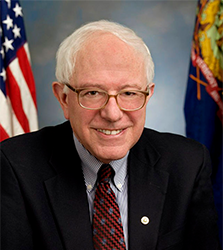
Sanders Campaign Has Its Regrets
It's probably too early to begin a full-on post mortem of the campaign of Vermont Sen. Bernie Sanders, but The New York Times has an article this morning suggesting some of that legendary 20/20 hindsight is beginning to make an appearance:
Early Missteps Seen as a Drag on Bernie Sanders’s Campaign
The morning after he lost the Nevada caucuses in February, Bernie Sanders held a painful conference call with his top advisers....
His strategy for capturing the Democratic presidential nomination was based on sweeping all three early-voting states, and he had fallen short, winning only New Hampshire — to the consternation of his wife, Jane, who questioned whether he should have campaigned more in 2015.
Without that sweep, his aides thought at the time, Mr. Sanders had little hope of overcoming his vast problems with black voters in the Southern primaries. And he had no convincing evidence to challenge Hillary Clinton’s electability.
The article focuses on three key decisions made by the candidate that appear to have come to haunt them:
Despite the urging of some advisers, Mr. Sanders refused last fall and early winter to criticize Mrs. Clinton over her $675,000 in speaking fees from Goldman Sachs, an issue that he now targets almost daily. He also gave her a pass on her use of private email as secretary of state, even though some allies wanted him to exploit it. And he insisted on devoting time to his job as a senator from Vermont last year rather than matching Mrs. Clinton’s all-out effort to capture the nomination. Some advisers now say that if he had campaigned more in Iowa, he might have avoided his critical loss there.
Sanders has mounted a much more significant challenge than many thought he would, and no campaign is error-free. But reading the full piece one can't help but conclude that a few basic errors by the candidate (and in each of these, it appears the campaign's leadership team wanted to go one way while Sanders opted for a different direction) may wind up being the difference between a campaign that had a good run but ultimately fell short (think Gary Hart in 1984) and a campaign that shocked the political establishment and will be remembered for generations (Barack Obama in 2008).



